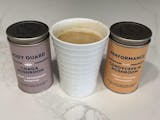Reishi and its Activity Against Liver Disease
Reishi and its Activity Against Diseases
Liver disease is any condition that damages the liver and prevents it from functioning well. There are many kinds of liver diseases: Diseases caused by viruses, such as hepatitis A, hepatitis B, and hepatitis C, and liver damage caused by drugs, poisons, or too much alcohol.
Ganoderic acids from Reishi were found to have a potent hepatoprotective effect in animal models with liver injury. (1)
Animal models, who experienced oxidative damage in the liver by excess alcohol, were given a hot-water extract of Reishi in a controlled setting. Pretreatment with Reishi maintained normal values of AST, ALT, SOD, and GSH enzymes, which are important enzymes measured clinically as biomarkers for liver health. (2)
A larger clinical study of 355 patients diagnosed with Hepatitis B were monitored after treatment with Wulingdan Pill, in which Reishi fruiting bodies is the main active ingredient. 328 of the patients reported to have positive results (that's a 92.4% positive correlation!). (3)
A separate animal study using ganoderic acid also showed inhibitory effects on the replication of hepatitis B virus (HBV). Hepatitis B is a viral infection that attacks the liver and can cause both acute and chronic disease. Production of HBV antigens were up to 44% higher than that of controls without ganoderic acid from Reishi. The same animal study showed protection from E.coli infection in the liver. (4)
Since alcohol and hepatotoxicity is associated with increased oxidative stress and free-radical-associated injury, hepatoprotection may also be mediated by the radical-scavenging properties of Reishi. (5)
Another animal study of subjects affected by cirrhosis, a chronic condition leading to scarring and liver failure, had a positive correlation when given polysaccharides from Reishi orally for 28 days. (6) The results state Reishi polysaccharides to be a promising anti-fibrotic agent. These are agents that reduce thick and scarring connective tissue after injury.
Click on other conditions to continue exploring studies done on Reishi:
References:
1. https://www.ncbi.nlm.nih.gov/pubmed/10077435
2. https://www.ncbi.nlm.nih.gov/pubmed/11789593
3. Georges M Halpern. Healing Mushrooms: Effecive treatment for today's illnesses, powerful antioxidant, natural anti-inflammatory, fights viruses and fungus, safe anti-bacterial. Square One Publishers, Inc., Feb 15, 2007 pg.34
4. https://www.ncbi.nlm.nih.gov/pubmed/16786250
5. https://www.ncbi.nlm.nih.gov/pubmed/7564419
6. https://www.ncbi.nlm.nih.gov/pubmed/9145221

